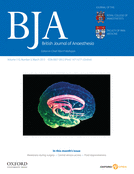
GENERAL ORTHOPAEDICS
Perioperative aspirin reduces major cardiac adverse events following non-cardiac surgery
This report has been verified
by one or more authors of the
original publication.
Br J Anaesth. 2010 Mar;104(3):305-12. doi: 10.1093/bja/aeq003.
220 high-risk patients undergoing elective, high- or intermediate-risk non-cardiac surgery were randomized to receive either aspirin (75 mg) or placebo daily, beginning 7 days prior to surgery until the third postoperative day. The purpose of this study was to determine whether continuing aspirin therapy in the perioperative period significantly reduced myocardial damage and the incidence of major cardiac adverse events (MACEs), without affecting bleeding outcomes, over 30 days post-operation. Results indicated that, although the incidence of myocardial damage was similar between groups, aspirin significantly reduced the incidence of MACEs (relative risk reduction: 80%; absolute risk reduction: 7.2%) and cardio-cerebrovascular events. There were no significant differences in the perioperative bleeding outcomes between the two interventions.
Unlock the full ACE Report
You have access to {0} free articles per month.Click below to unlock and view this {1}
Unlock NowCritical appraisals of the latest, high-impact randomized controlled trials and systematic reviews in orthopaedics
Access to OrthoEvidence podcast content, including collaborations with the Journal of Bone and Joint Surgery, interviews with internationally recognized surgeons, and roundtable discussions on orthopaedic news and topics
Subscription to The Pulse, a twice-weekly evidence-based newsletter designed to help you make better clinical decisions
Exclusive access to original content articles, including in-house systematic reviews, and articles on health research methods and hot orthopaedic topics
Or upgrade today and gain access to all OrthoEvidence content for just $1.99 per week.
Already have an account? Log in


Subscribe to "The Pulse"
Evidence-Based Orthopaedics direct to your inbox.
{0} of {1} free articles
Become an OrthoEvidence Premium Member. Expand your perspective with high-quality evidence.
Upgrade Now













































































